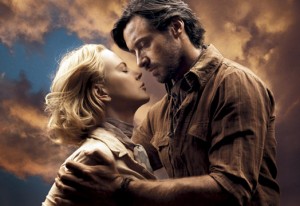
There are some fairly obvious story flaws in Baz Luhrmann’s Australia. But the reason it didn’t work was far more fundamental.
Passion recollected in tranquillity
Wordsworth said that his poetry was “emotion recollected in tranquillity” and I think that’s true of most great writing. The poet, the novelist, the screenwriter, experiences something that inspires them to share it. We feel grief, joy, frustration, anger, envy, outrage or overwhelming love and we pick up a pen.
Great movies inspired by the writer’s experiences
Take Dead Poets Society. Oscar winner Tom Schulman was inspired by his experiences at a prep school in Nashville and Robin Williams’ character was based on one of his teachers. Oscar winning screenplay Moonstruck was inspired by Irish-American John Patrick Shanley’s experiences growing up around Italian Americans in the Bronx. Bull Durham was inspired by Ron Shelton’s experiences on dirt-track American minor league baseball fields and Tim Robbins’ character was based on the hardest throwing pitcher he ever saw, Steve Dalkowski. Even Baz Luhrmann’s own Strictly Ballroom was inspired by his time as a ballroom dancer. But a writer’s experiences didn’t drive Australia – and, frankly, it shows.
What drove the creation of Australia?
With Australia, as I understand it, Baz set out to make an epic film about Australia, an old-fashioned movie on a grand scale that drew on the splendour of the Australian landscape. Now, you can imagine Baz pitching that at Fox and everyone going, yeah, wow, fantastic, Baz – here’s a lazy $150 million – go make it. But it’s all surface and no heart. The story’s not being driven by an emotion Baz has experienced. Nor was it driven by the passions of any of the other three credited writers on the film – Stuart Beattie, Richard Flanagan or Ronald Harwood – all talented, accomplished writers. Ten writers could have worked on the project, but unless one of them found a way to connect with their heart, it was never going to touch us.
What can we learn from Baz’s Luhrmann’s Australia?
Baz Luhrmann is a very good director. A showman. And one of our most successful film makers. But with Australia he shows us that even really talented filmmakers can get it horribly wrong when they don’t remember what inspired their early success. And what drives all great writing. Does the story you’re working on at the moment draw on your own personal experiences? Your emotions? Your pain? Your passion? If not, find some way to draw on that vital fuel, or bin it and find something that does. How can you expect to move an audience if you yourself haven’t been moved?